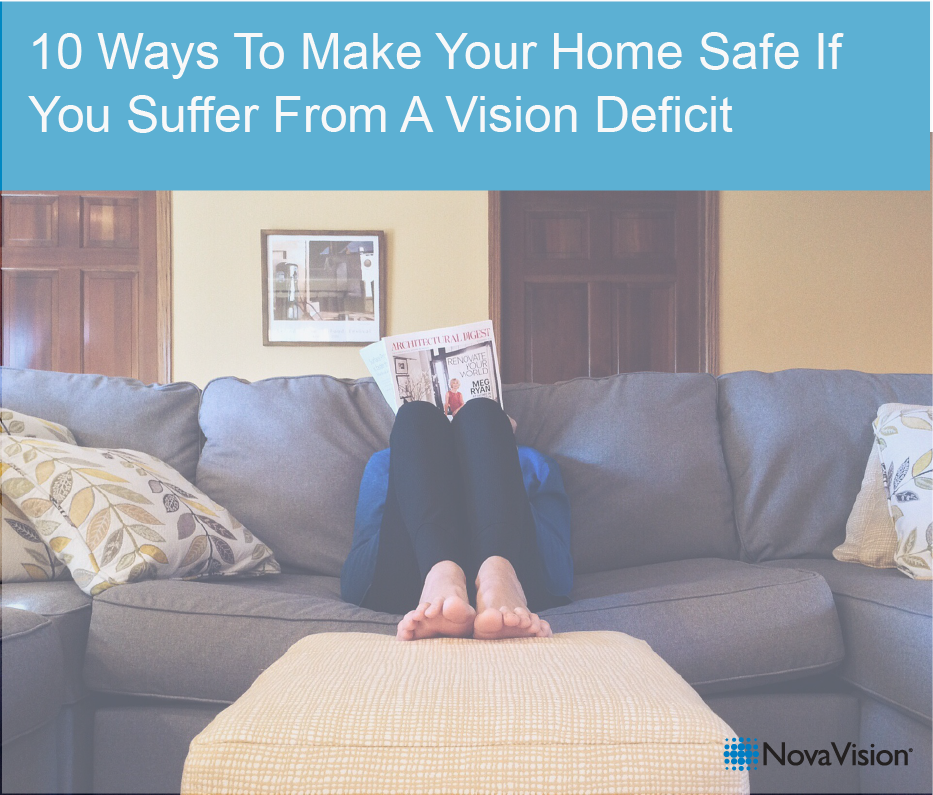
Suffering from a vision deficit can be a terrifying thing for anyone to experience – especially after surviving a stroke or traumatic brain injury. Often times, patients and caregivers are overwhelmed with the sheer volume of todo’s when coming home from the hospital.
Even simple tasks like bathing, cooking, and doing laundry can become more difficult with a visual deficit. So, it’s important to understand how to stay safe while facing this difficult time.
There are a few simple things you can do as a patient and especially as a caregiver or loved on to make living at home easier and safer. These simple changes will allow you as a patient to remain in control, independent, and safe.
1. Eliminate Opportunities For Tripping
Tripping over objects is a huge safety hazard for anyone with vision problems. To avoid tripping, eliminate the possibilities: Remove small throw rugs, move electrical cords close to the baseboards, and move any obstructive objects (e.g. magazine racks, plants, and little tables) away from walkways.
2. Remove Any Slipping Hazards
Perhaps the only thing more traumatic that tripping is slipping. It’s an incredibly easy way to become severely injured. To avoid this, take precautions like using a non-skid bath mat and cleaning up spills immediately. Consider having carpet stair treads installed to eliminate slippery stairs.
3. Clearly Label Products For The Home
There are many hazardous situations that can arise from not being able to read a label — even at home. Label all household cleaners, toxic substances, combustible products and flammable items clearly and readable to avoid accidental — and potentially dangerous — mixups.
4. Take Smart Electrical Precautions
Finding electrical outlets can be difficult — but never, ever try to locate one by using your fingertips! This can lead to electrocution! Instead, find the outlet sockets by moving the prongs in the plug from side to side or up and down until you get it right.
5. Use Colors To Create Contrast
Colors can work wonders in a home. Use brightly colored paint or tape to place identifying markings in certain areas around the house. For example, you can mark the edges of steps to increase visibility with bright-colored anti-slip tape or use colorful painter’s tape to mark corners.
6. Clean Up Immediately
Even if it is difficult sometimes, cleaning up spills and items on the floor immediately is a critical safety precaution to avoid slipping.
Make sure everything has its place and gets put back into the same location right after use. Pick up books, shoes and clothing right away. And make sure always to close closet doors, cabinets, drawers and cupboards as soon as you’ve taken out what you need.
7. Install The Proper Alarms
When you have a vision deficit, it can be more challenging to identify potential danger. Install security, fire, smoke and carbon monoxide alarms in your home and make sure to change the batteries regularly to ensure they’re working.
8. Locate Specific Areas Of The Home
Identify critical areas of the home, like the water turn-off valve and circuit breaker box.
If you do now know how to operate it, have someone show you and practice a couple of times, so it becomes almost second nature. Then you can work them when needed without overly relying on your eyesight.
9. Make Visitors Identify Themselves
You should never open the door for someone that seems unfamiliar — especially if your disability is well-known in the community. When a visitor arrives, keep your doors locked until they’ve identified themselves. Don’t be afraid to ask as many questions as necessary until you’re sure you know who this person is.
10. Create Emergency Protocols
It’s important to understand what to do in an emergency — even for people without vision problems. But for you, safety protocols become even more important. Knowing what to do during a fire could mean the difference between life and death.
What Other Safety Precautions Do You Take?
Please share with us, what other steps you have implemented in your home to make your house safer to navigate and your life easier to organize? Please share with us in the comments so other stroke or TBI survivors might benefit.



